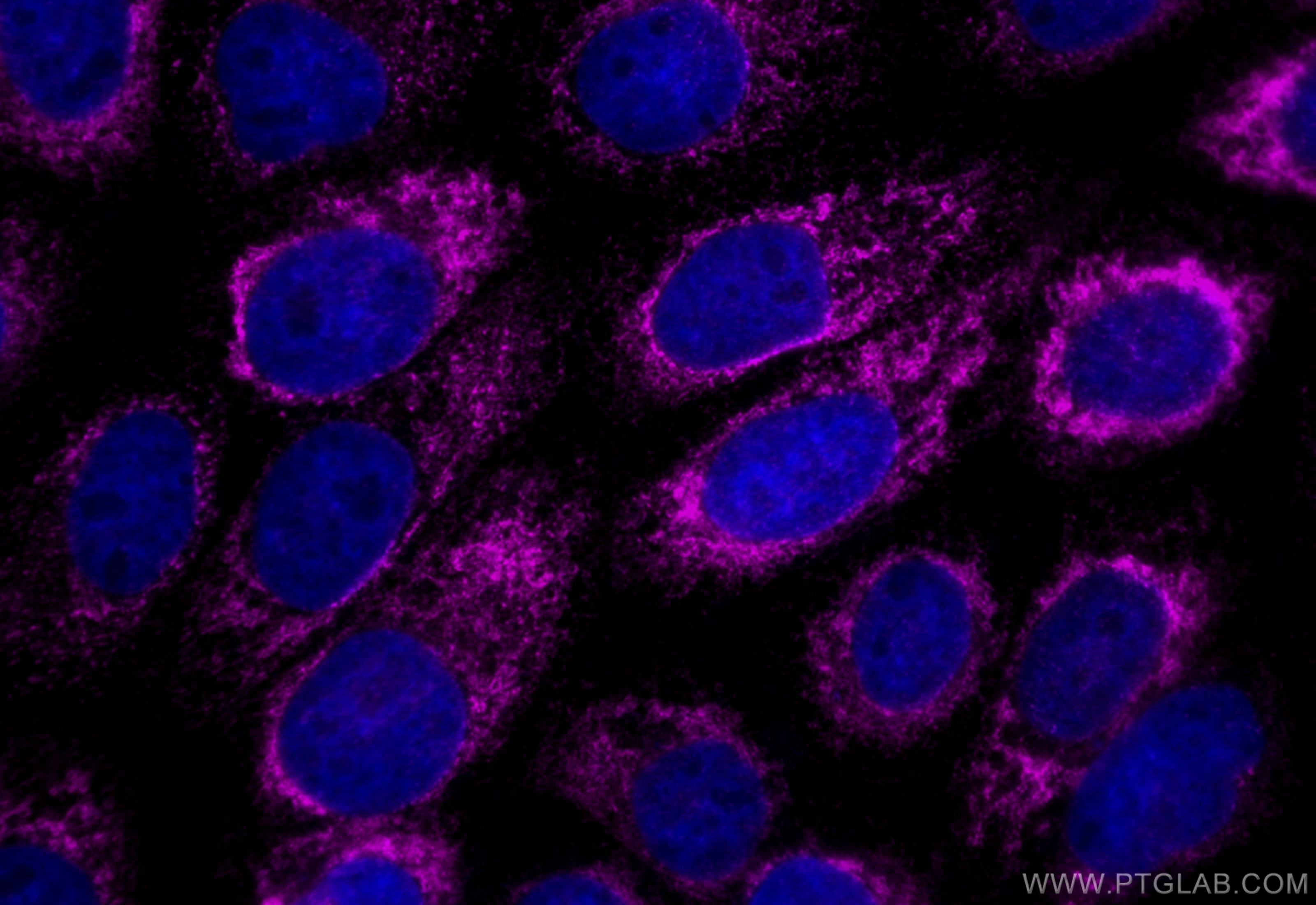Tested Applications
| Positive IF/ICC detected in | A431 cells |
Recommended dilution
| Application | Dilution |
|---|---|
| Immunofluorescence (IF)/ICC | IF/ICC : 1:50-1:500 |
| It is recommended that this reagent should be titrated in each testing system to obtain optimal results. | |
| Sample-dependent, Check data in validation data gallery. | |
Product Information
CL647-84485-4 targets CKAP4 in IF/ICC applications and shows reactivity with human samples.
| Tested Reactivity | human |
| Host / Isotype | Rabbit / IgG |
| Class | Recombinant |
| Type | Antibody |
| Immunogen |
CatNo: Ag10022 Product name: Recombinant human CKAP4 protein Source: e coli.-derived, PET28a Tag: 6*His Domain: 254-602 aa of BC082972 Sequence: IFTEVQKRSQKEINDMKAKVASLEESEGNKQDLKALKEAVKEIQTSAKSREWDMEALRSTLQTMESDIYTEVRELVSLKQEQQAFKEAADTERLALQALTEKLLRSEESVSRLPEEIRRLEEELRQLKSDSHGPKEDGGFRHSEAFEALQQKSQGLDSRLQHVEDGVLSMQVASARQTESLESLLSKSQEHEQRLAALQGRLEGLGSSEADQDGLASTVRSLGETQLVLYGDVEELKRSVGELPSTVESLQKVQEQVHTLLSQDQAQAARLPPQDFLDRLSSLDNLKASVSQVEADLKMLRTAVDSLVAYSVKIETNENNLESAKGLLDDLRNDLDRLFVKVEKIHEKV Predict reactive species |
| Full Name | cytoskeleton-associated protein 4 |
| Calculated Molecular Weight | 602 aa, 66 kDa |
| Observed Molecular Weight | 63 kDa |
| GenBank Accession Number | BC082972 |
| Gene Symbol | CKAP4 |
| Gene ID (NCBI) | 10970 |
| Conjugate | CoraLite® Plus 647 Fluorescent Dye |
| Excitation/Emission Maxima Wavelengths | 654 nm / 674 nm |
| Form | Liquid |
| Purification Method | Protein A purification |
| UNIPROT ID | Q07065 |
| Storage Buffer | PBS with 50% glycerol, 0.05% Proclin300, 0.5% BSA, pH 7.3. |
| Storage Conditions | Store at -20°C. Avoid exposure to light. Stable for one year after shipment. Aliquoting is unnecessary for -20oC storage. |
Background Information
CKAP4 (Cytoskeleton-associated protein 4), also known as CLIMP-63 (cytoskeleton-linking membrane protein 63), is a 63 kDa cytoskeleton-linking membrane protein. CKAP4 is a novel DKK1-binding protein on the cell surface membrane of Madin-Darby canine kidney (MDCK) epithelial cells, and evaluated CKAP4-mediated DKK1 signaling in cancer cell proliferation (PMID: 27322059). In addition, CKAP4 was modified with palmitate at Cys100 by palmitoyl acyltransferase DHHC2 (PMID: 18296695), and palmitoylation was required for CKAP4 localization to PM lipid rafts to promote cancer cell proliferation (PMID: 31744930).
Protocols
| Product Specific Protocols | |
|---|---|
| IF protocol for CL Plus 647 CKAP4 antibody CL647-84485-4 | Download protocol |
| Standard Protocols | |
|---|---|
| Click here to view our Standard Protocols |




